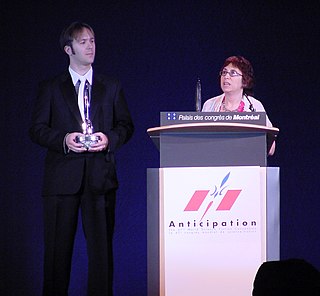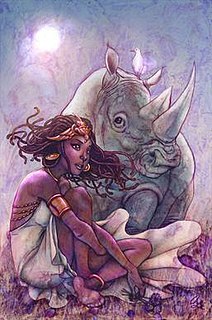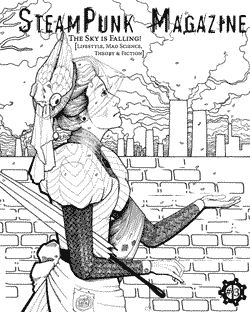
Jeff VanderMeer is an American author, editor, and literary critic. Initially associated with the New Weird literary genre, VanderMeer crossed over into mainstream success with his bestselling Southern Reach Trilogy. The trilogy's first novel, Annihilation, won the Nebula and Shirley Jackson Awards, and was adapted into a Hollywood film by director Alex Garland. Among VanderMeer's other novels are Shriek: An Afterword and Borne. He has also edited with his wife Ann VanderMeer such influential and award-winning anthologies as The New Weird, The Weird, and The Big Book of Science Fiction.
The Thackery T Lambshead Pocket Guide to Eccentric & Discredited Diseases (2003) is an anthology of fantasy medical conditions edited by Jeff VanderMeer and Mark Roberts, and published by Night Shade Books.

Weird fiction is a subgenre of speculative fiction originating in the late 19th and early 20th centuries. John Clute defines weird fiction as a "Term used loosely to describe Fantasy, Supernatural Fiction and Horror tales embodying transgressive material". China Miéville defines weird fiction thus: "Weird Fiction is usually, roughly, conceived of as a rather breathless and generically slippery macabre fiction, a dark fantastic often featuring nontraditional alien monsters ." Discussing the "Old Weird Fiction" published in the late 19th and early 20th centuries, Jeffrey Andrew Weinstock says, "Old Weird fiction utilises elements of horror, science fiction and fantasy to showcase the impotence and insignificance of human beings within a much larger universe populated by often malign powers and forces that greatly exceed the human capacities to understand or control them." Weird fiction either eschews or radically reinterprets ghosts, vampires, werewolves, and other traditional antagonists of supernatural horror fiction. Weird fiction is sometimes symbolised by the tentacle, a limb-type absent from most of the monsters of European folklore and gothic fiction, but often attached to the monstrous creatures created by weird fiction writers such as William Hope Hodgson, M. R. James, and H. P. Lovecraft. Weird fiction often attempts to inspire awe as well as fear in response to its fictional creations, causing
commentators like Miéville to say that weird fiction evokes a sense of the numinous. Although "weird fiction" has been chiefly used as a historical description for works through the 1930s, the term has also been increasingly used since the 1980s, sometimes to describe slipstream fiction that blends horror, fantasy, and science fiction.

Nemonymous was a short fiction publication that labeled itself a "megazanthus". It was published in the United Kingdom and edited by British writer D. F. Lewis.
Annihilation, in physics, is an effect that occurs when a particle collides with an antiparticle.
Toni Jerrman is critic and editor of the Finnish sci-fi magazine Tähtivaeltaja. He founded the Tähtivaeltaja and Tähtifantasia Awards.
The new weird is a literary genre that began in the 1990s and developed in a series of novels and stories published from 2001 to 2005. M. John Harrison is credited with creating the term "New Weird" in the introduction to China Miéville's novella The Tain (2002). The writers involved are mostly novelists who are considered to be parts of the horror or speculative fiction genres but who often cross genre boundaries. Notable authors include K. J. Bishop, Steve Cockayne, Paul Di Filippo, M. John Harrison, Thomas Ligotti, Ian R. MacLeod, China Miéville, Alastair Reynolds, Justina Robson, Steph Swainston, and Jeff VanderMeer, among others.
Fantasy Magazine was an American online fantasy and science fiction magazine. It was launched as a print edition at the 2005 World Fantasy Convention in Madison, Wisconsin. It continued in this format for six more issues, but in mid-October 2007, it moved online, with daily content, and spun off an original anthology, titled Fantasy. The magazine has published, in the past, stories by Peter S. Beagle, Jeffrey Ford, Theodora Goss, Caitlin Kiernan, Joe R. Lansdale, Nick Mamatas, Tim Pratt, Cat Rambo, Ekaterina Sedia, Catherynne M. Valente, Jeff VanderMeer, and more.
Nova Express was a Hugo-nominated science fiction fanzine edited by Lawrence Person. Nova Express is named after William S. Burroughs' Nova Express and the fictional magazine Nova Express in Alan Moore's Watchmen. It remained in publication between 1987 and 2002.

Ann VanderMeer is an American publisher and editor, and the second female editor of the horror magazine Weird Tales. She is the founder of Buzzcity Press.

Cat Rambo is an American science fiction and fantasy writer and editor. She was co-editor of Fantasy Magazine from 2007 to 2011, which earned her a 2012 World Fantasy Special Award: Non-Professional nomination. She collaborated with Jeff VanderMeer on The Surgeon's Tale and Other Stories, published in 2007.
Dru Pagliassotti is an author of fantasy literature and the editor of The Harrow online magazine.

Gaslamp fantasy is a subgenre of both fantasy and historical fiction. Generally speaking, this particular realm of fantasy employs either a Victorian or Edwardian setting. The gaslamp fantasy genre is not to be confused with steampunk, which usually has more of a super-science edge and uchronic tone. Gaslamp fantasy also differs from classical Victorian/Edwardian faerie or pure fantasy in the J.R.R. Tolkien or Lewis Carroll style or from historical crime-novels in the Anne Perry or June Thomson style by the supernatural elements, themes, and subjects it features. Many of its tropes, themes, and stock characters derive from Gothic literature — a long-established genre composed of both romantic and horrific traits and motivated by the desire to rouse fear, apprehension, and other intense emotions within the reader — and could be described as an attempt to modernize literary Gothicism.

Alice Meichi Li (李美姿) is a Chinese-American, New York City-based visual artist and illustrator for comic books, magazines, and album covers.

Geoffrey D. Falksen, is an American steampunk writer.

Liz Gorinsky is the publisher of Erewhon Books, a former editor for Tor Books, multiple Hugo award nominee, and 2017 Hugo Award winner in the category of Best Editor.
The Southern Reach Trilogy is a series of novels by the American author Jeff VanderMeer first published in 2014—Annihilation, Authority, and Acceptance. The trilogy takes its name from the secret agency that is central to the plot. In 2013, Paramount Pictures bought the movie rights for the series, and a film adaptation of Annihilation was made with Alex Garland as writer-director. The film was released in 2018.
"Ripples in the Dirac Sea" is a science fiction short story by Geoffrey Landis. It was first published in Asimov's Science Fiction in October 1988.












